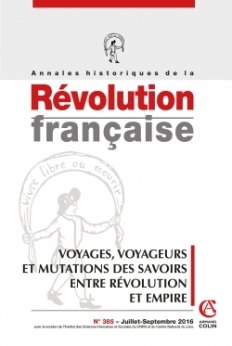
Annales historiques de la Révolution française n° 385 (3/2016)
Pour acheter ce numéro, contactez-nous
Recevez les numéros de l'année en cours et accédez à l'intégralité des articles en ligne.
Dès leur traduction en 1793, les Voyages en France d’Arthur Young ont rencontré en France un véritable succès public, largement porté par les institutions républicaines et la communauté des agronomes. Mais cette réception est équivoque. Dès le Consulat, l’oeuvre de Young est instrumentalisée par les agronomes français pour contraindre l’État à entreprendre la grande politique agricole à laquelle ils aspirent depuis plus d’une décennie. L’Empire répond à leurs attentes, et dans la logique de reclassement des savoirs qu’il met en place, s’élabore un essai de redéfinition des conventions du voyage agronomique. Son institutionnalisation, sa spécialisation scientifique et son instrumentalisation à des fins politiques deviennent ses caractéristiques nouvelles et inabouties.
From its translation in 1793, the Travels in France of Arthur Young enjoyed a veritable public success, largely because of the Republican Institutions and the community of agronomists. But this reception was ambiguous. Beginning with the Consulate, the work of Young was used by French agronomists to compel the State to undertake a major agricultural program to which they had aspired for more than a decade. The Empire met these expectations, and in the rationale of the reorganization of knowledge it instituted, was an attempt at redefining the conventions of an agricultural voyage. This institutionalization, its scientific specialization, as well as its use for political ends, became its new and unfinished characteristics.